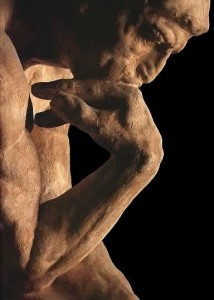In the American founding era, most of the leading thinkers were rationalists.
This means that they believed in reason as a top method of determining truth.
Note that the general concept of reason has changed since then.
When most people think of reason today, they tend to mix it with the ideas of logic, science and determinism.
In the American colonial and early republican era, this was not the case.
The term “science” was often used to mean general thinking and the idea of learning, and in this sense it coincided with the rational perspective.
But today’s technical science, based on a general consensus of experts along with the empirical use of the scientific method, is quite the opposite of the rationalist viewpoint.
And logic, which is actually a branch of mathematics (rather than philosophy), is very different than reason.
Reason, in the original sense, is the use of one’s own mind to test and analyze the words of the experts, the ancients, and all authority.
In the founding generation, reason was a check and balance on the smug groupthink[i] of the upper classes and elites.
Most of the leading founders usually used the term “right reason” rather than simple “reason,” since this first phrase carried the connotation that all right-thinking people would come to the same conclusions if they had the benefit of adequate information.
In this view, no king, priest, aristocrat or expert can rely simply on some claim to a “divine right” of expertise to be correct—each individual citizen can test everything said by the elites simply by taking the time to obtain all needed information and then think it through.
Forrest McDonald wrote in the introduction to Empire and Nation, a collection of writings by American founders John Dickinson and Richard Henry Lee:
“In the historical view, men have such rights as they have won over the years; in the rationalist view, men are born with certain rights, whether they are honored in a particular society or not.”
Using reason, leading American founder John Dickinson wrote:
“Ought not the people therefore to watch? to search into causes? to investigate designs? And have they not a right of JUDGING from the evidence before them, on no slighter points than their liberty and happiness?”[ii]
It is always up to the people to maintain their freedom, and one of the first steps is to think—independently as they see fit—regardless of the assurances, promises and statistics of experts and elites.
Throughout history, the experts have nearly always worked for the elites, and the regular people have held reason as their first line of defense.
When the regular people put expertise, tradition, authority or official promises above their own reason, they have always lost their freedoms and prosperity.
Dickinson put it this way:
“Indeed, nations, in general, are not apt to think until they feel; and therefore nations in general have lost their liberty.”[iii]
[i] This word, of course, came into usage after the American founding era.
[ii] Letters from a Pennsylvania Farmer, Letter VI.
[iii] Ibid., Letter XI.
***********************************
 Oliver DeMille is the founder and former president of George Wythe University, a co-founder of the Center for Social Leadership, and a co-creator of TJEd Online.
Oliver DeMille is the founder and former president of George Wythe University, a co-founder of the Center for Social Leadership, and a co-creator of TJEd Online.
He is the author of A Thomas Jefferson Education: Teaching a Generation of Leaders for the 21st Century, and The Coming Aristocracy: Education & the Future of Freedom.
Oliver is dedicated to promoting freedom through leadership education. He and his wife Rachel are raising their eight children in Cedar City, Utah.







Speak Your Mind
You must be logged in to post a comment.